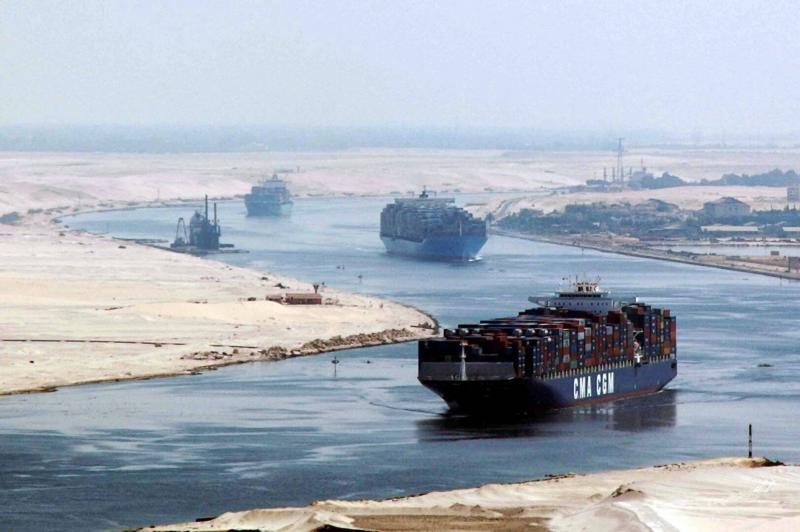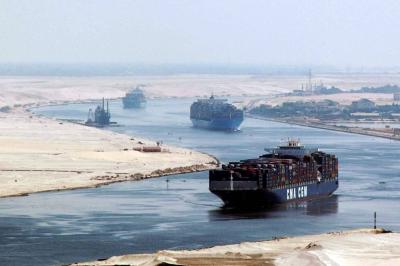The attacks launched by the Houthis against ships in the Red Sea have led to economic losses for the Suez Canal; however, Egypt did not join the coalition against them. The "Ansar Allah" (Houthi) attacks on ships bound for Israel in the southern Red Sea have prompted major shipping companies to shift their trade routes from the Suez Canal to circumnavigate Africa via the Cape of Good Hope. The Houthis have successfully disrupted trade with Israel since last month, drawing global attention to the war in Gaza to pressure Israel into an immediate ceasefire.
Egypt seems to be the most affected country by the disruption of maritime traffic in Bab al-Mandab and increasing military tensions in the southern Red Sea, impacting a vital trade route where 12% of global trade passes through the Suez Canal. The Suez Canal is one of Egypt's most important sources of foreign currency, with annual revenue reaching a record $9.4 billion last year. Several major shipping companies have announced changes in their sailing routes, opting not to pass through the Red Sea via the Suez Canal, which has led to increased product prices and delays in global supply chains. While the impact is still modest as of this writing, a greater increase in prices is expected over time.
Due to actions by Iran and the Houthis and under the pretext of preventing harm to the global economy, the United States established a multinational naval force on December 18th, expected to protect commercial ships operating in the region. Canada, France, Italy, the Netherlands, Norway, Bahrain, and Spain have joined the naval force known as "Guardians of Prosperity." Notably absent from this coalition are Israel, Saudi Arabia, and Egypt.
Why does Cairo refuse to engage in hostile actions against the Houthis to defend its most significant national income source, the Suez Canal?
First: Leadership under President Abdel Fattah el-Sisi prefers diplomacy in dealing with all issues, even the most sensitive and dangerous ones. The president has not gone to war over Ethiopia regarding the Grand Ethiopian Renaissance Dam, which threatens Egypt's future, nor will he enter a war in Yemen for Suez Canal revenues.
Second: Egypt's domestic front is suffering from significant economic problems, and a decision for war would threaten Egypt's interests, leading to more losses and instability since such a decision would not achieve popular consensus, unlike the consensus on taking deterrent measures regarding the Grand Ethiopian Renaissance Dam.
Third: Egypt understands that the stated goal of the war by the United States and its allies—to restore calm to the international waters and eliminate threats to Israel's security—will not be achieved from the Egyptian perspective by waging war against the Houthis. Instead, addressing the root causes of these tensions, namely the ongoing war in Gaza, is necessary as its continuation threatens regional and global stability.
Fourth: Currently, the experience of the Arab coalition led by Saudi Arabia in its war in Yemen remains vivid. Saudi Arabia has participated alongside Egypt, Morocco, Jordan, Sudan, the United Arab Emirates, Kuwait, and Bahrain. Somalia has opened its airspace and territorial waters to the Arab coalition and provided logistical support from the United States for operations. Despite this, the states realized after losses of soldiers, equipment, and military expenditures exceeding billions of dollars that there is no escape from diplomacy and they exited this conflict, recognizing that it is a war without winners—everyone who enters it is a loser.
Fifth: The Arab position regarding the new coalition against the Houthis appears unified, with all Arab countries refusing to participate except Bahrain. Observers viewed its participation as a token gesture to avoid angering the United States, yet it clearly signals that the Arabs will not enter a proxy war for anyone, especially as the United States has declared its full support for Israel in its war on Gaza. Joining this coalition would equate to siding with Israel, which would provoke widespread popular outrage.
Sixth: Iranian reassurances came when Iranian President Ebrahim Raisi sent comforting messages to Egyptian President Abdel Fattah el-Sisi, indicating that the Suez Canal would not be affected by the Houthis escalating their attacks on Israeli ships or those heading to Israel in the Red Sea, according to Egyptian diplomatic sources. The Houthis receive support from Iran. At the end of December, the Wall Street Journal reported that an Iranian spy ship was operating in the Red Sea disguised as a commercial vessel, assisting the Houthis in identifying maritime targets for attacks. According to the newspaper, many ships sailing in the Red Sea and in the Bab al-Mandab area have turned off their automatic detection systems to avoid being detected by the Houthis.




